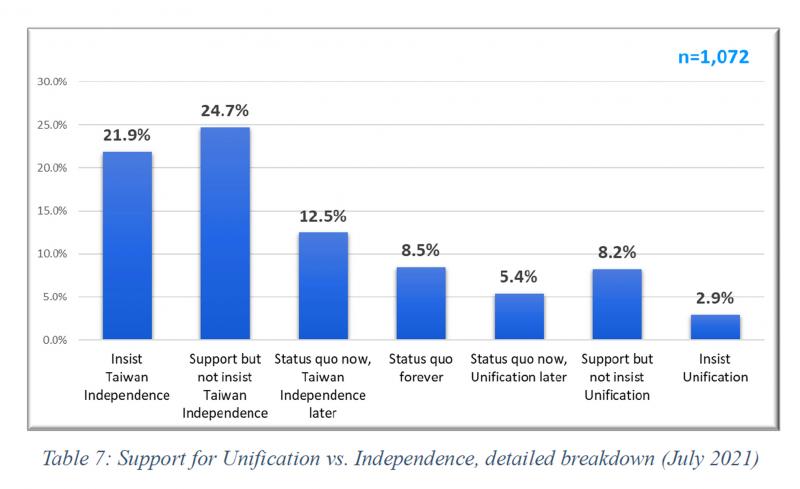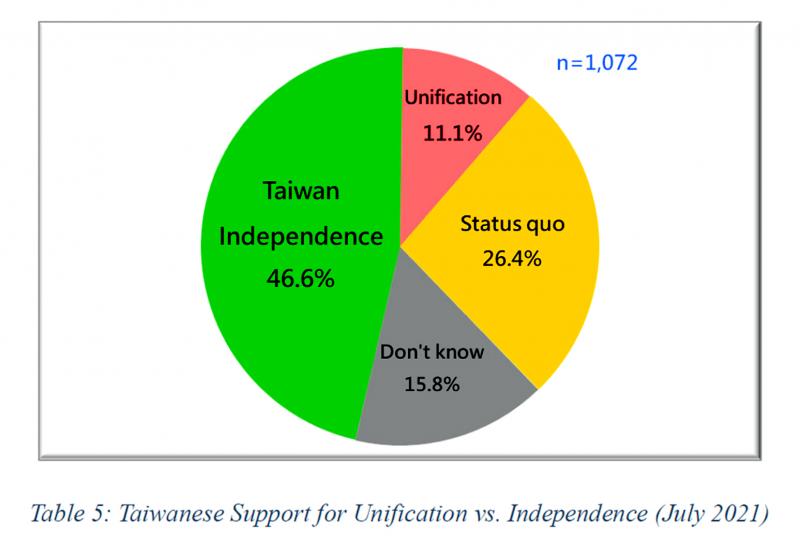Imagine if poor people were polled on why they drove beat up old cars. Imagine if that poll had several answers, which were “might want a better car if possible,” “want a better car as soon as possible,” “waiting on it” and “don’t want a better car.” Imagine if most people answered “waiting on it” and then, disregarding all other data, from that a scholar concluded that most poor people don’t want to drive a better car.
That conclusion is absurd, and yet that is one we have seen again and again in describing the preferences of Taiwanese for the final status of their country. That argument is based almost exclusively on a misleading but widely-used survey from National Chengchi University’s (NCCU) Election Study Center, “Changes in the Unification — Independence Stances of Taiwanese.”
That poll, a relic from the waning days of authoritarian power (the poll begins in 1994, the year after the repeal of the national security law that was martial law redux), was conceived by academics ensconced in a university that had been the former political warfare school of the Chinese Nationalist Party (KMT). It has the magical power of chopping the Taiwanese electorate into various groups that appear to support the status quo, thus obscuring the massive support for independence in Taiwan even in those days.

Photos courtesy of Taiwanese Public Opinion Foundation
Almost as if that were its purpose.
That poll is routinely cited by pro-Blue politicians and academics as evidence that the majority do not support independence in Taiwan (a sure signal it should never be used by anyone who cares about the truth). It is also commonly referred to by neutral media organs, which deploy it as cover: if they refer to that poll, they can avoid pointing out that the majority of people in Taiwan favor independence.
That NCCU poll thus makes it possible to claim that the Taiwanese are muddled about independence, even to claim that most don’t support it, and yet appear rational.

Photos courtesy of Taiwanese Public Opinion Foundation
Despite decades of excellent journalists being based here, few if any articles have ever forthrightly stated that Taiwanese would prefer independence. The NCCU survey has done yeoman work for China in preventing that.
The last few weeks have seen this poll appearing again in the media, a Coelacanth dragged up from the benthic deeps of bad journalism. For example, a recent Yahoo Finance piece, “Why You Should Care About Taiwan” scribed: “Generally speaking, a slight majority of Taiwanese (54.7 percent), according to an annual poll by the Taiwan’s National Chengchi University, prefer the status quo.”
After reviewing the survey’s other findings, the writer returns with: “To me all this suggests that the answer as to whether the Taiwanese consider Taiwan part of China is a definitive, ‘sort of.’”
This problem is commonplace — it also popped up on otherwise excellent Jon Oliver segment on Taiwan — and it can be solved if that poll were simply ignored into the authoritarian oblivion from whence it came.
Scores of polls conducted in the last two decades show that if Taiwanese are given the two choices of independence or “unification,” overwhelming majorities prefer independence. But in a Twitter debate on this very topic, Lev Nachman, the well-known scholar and commentator on Taiwan, dismissed these by saying: “Like, forcing a choice between two extremes is so methodologically problematic and a false portrayal of reality.”
Very well. Are there polls that interrogate the status quo? Of course. The pro-Green Taiwan Public Opinion Foundation (TPOF) has a regular poll on that topic. This August it released its latest incarnation of that survey.
Given two simple choices — independence, or “unification,”— 46 percent of Taiwanese chose independence, while 26.4 percent reported they favor the status quo, though that wasn't one of the choices offered.* Apparently, Taiwanese don’t support the status quo, as the TPOF presentation itself observed after identifying the importance of this finding: “…given the fact that both Taiwan’s pan-blue (KMT) and pan-green ([Democratic Progressive Party] DPP) administrations over the past two decades repeatedly claimed the people of Taiwan desire “maintaining status quo” forever — which clearly runs contrary to what our polls found.”
The TPOF interrogated the status quo in other ways. It asked whether people insist on Taiwan independence (21.9 percent), support but not insist on independence (24.7 percent), status quo now, independence later (12.5 percent), status quo forever (8.5 percent) and then mirrored the first three questions for the pro-China side (16.5 percent total for all three pro-China questions).
The TPOF data shows that far from preferring the status quo, the preferred outcome is independence. Furthermore, since 2006, the status quo, has never crossed 30 percent support.
The majority of people don’t support the status quo, according to TPOF data.
It should be blindingly obvious at this point, as everyone who lives here knows, that the Taiwanese favor the status quo because it is a weak form of independence and the best they can get for now, given Chinese war threats.
ETHICAL POLL?
Thus, the claim that “Taiwanese support the status quo” harnesses China’s threats of violence to help blind observers to the existence of powerful pro-independence sentiment in Taiwan. This compels the question of whether it is even ethical to cite such a poll.
Note that in each survey, the loaded term “unification” with its implication of smooth completion of something heretofore unfinished is used to describe China’s annexation of Taiwan. What would all these polls look like if “annexation” were the choice opposite “independence?”
The irony of using the authoritarian dinosaur NCCU status quo poll is that the Election Center at NCCU has another long-term data set that goes back to 2004, the Taiwan Election and Democratization Studies (TEDS) set, which asks conditional independence questions. This dataset is widely used by scholars, but never by the media. Sadly.
The first question in the TEDS set addresses whether the respondent supports independence if peace is maintained. That one generally has between 60 percent and 70 percent support. This is similar to other “conditional independence” questions in other polls.
Nor, as is often expressed in another hoary media trope, the “rising support for independence” is the demand for independence a new thing in Taiwan. Numerous scholars and journalists in the 1950s and early 1960s wrote that the Taiwanese wanted independence.
For example, Albert Axelbank, the UPI Bureau Manager on Taiwan from 1960 to 1962 observed (Harper’s Magazine, September 1963): “But responsible Formosan leaders, both Kuomintang [KMT] and opposition members, have told me that more than 90 per cent of the people desire the establishment of an independent Formosan republic.”
Peering into the future, Axelbank writes that some Formosans said that “the time will come when younger generation Formosans — and mainlanders who have become “Formosanized” — will live in harmony under a government run predominantly by Formosans.”
That time is today.
The media should consign the NCCU poll to a well-deserved oblivion and go with what the overwhelming number of polls on Taiwan show: the people of the island of Taiwan want independence, and have always wanted it.
* Due to differences in the results of the Chinese-language and English-language versions of the TPOF poll, the latter of which is cited in this column, we incorrectly stated that the TPOF gave four choices — independence, "unification," status quo and don't know — in their poll. The TPOF only gave two choices, independence and "unification," in the official Chinese-language version. The Taipei Times regrets the error.
Notes from Central Taiwan is a column written by long-term resident Michael Turton, who provides incisive commentary informed by three decades of living in and writing about his adoptive country. The views expressed here are his own.

Taiwan has next to no political engagement in Myanmar, either with the ruling military junta nor the dozens of armed groups who’ve in the last five years taken over around two-thirds of the nation’s territory in a sprawling, patchwork civil war. But early last month, the leader of one relatively minor Burmese revolutionary faction, General Nerdah Bomya, who is also an alleged war criminal, made a low key visit to Taipei, where he met with a member of President William Lai’s (賴清德) staff, a retired Taiwanese military official and several academics. “I feel like Taiwan is a good example of

March 2 to March 8 Gunfire rang out along the shore of the frontline island of Lieyu (烈嶼) on a foggy afternoon on March 7, 1987. By the time it was over, about 20 unarmed Vietnamese refugees — men, women, elderly and children — were dead. They were hastily buried, followed by decades of silence. Months later, opposition politicians and journalists tried to uncover what had happened, but conflicting accounts only deepened the confusion. One version suggested that government troops had mistakenly killed their own operatives attempting to return home from Vietnam. The military maintained that the

Before the last section of the round-the-island railway was electrified, one old blue train still chugged back and forth between Pingtung County’s Fangliao (枋寮) and Taitung (台東) stations once a day. It was so slow, was so hot (it had no air conditioning) and covered such a short distance, that the low fare still failed to attract many riders. This relic of the past was finally retired when the South Link Line was fully electrified on Dec. 23, 2020. A wave of nostalgia surrounded the termination of the Ordinary Train service, as these train carriages had been in use for decades

Lori Sepich smoked for years and sometimes skipped taking her blood pressure medicine. But she never thought she’d have a heart attack. The possibility “just wasn’t registering with me,” said the 64-year-old from Memphis, Tennessee, who suffered two of them 13 years apart. She’s far from alone. More than 60 million women in the US live with cardiovascular disease, which includes heart disease as well as stroke, heart failure and atrial fibrillation. And despite the myth that heart attacks mostly strike men, women are vulnerable too. Overall in the US, 1 in 5 women dies of cardiovascular disease each year, 37,000 of them